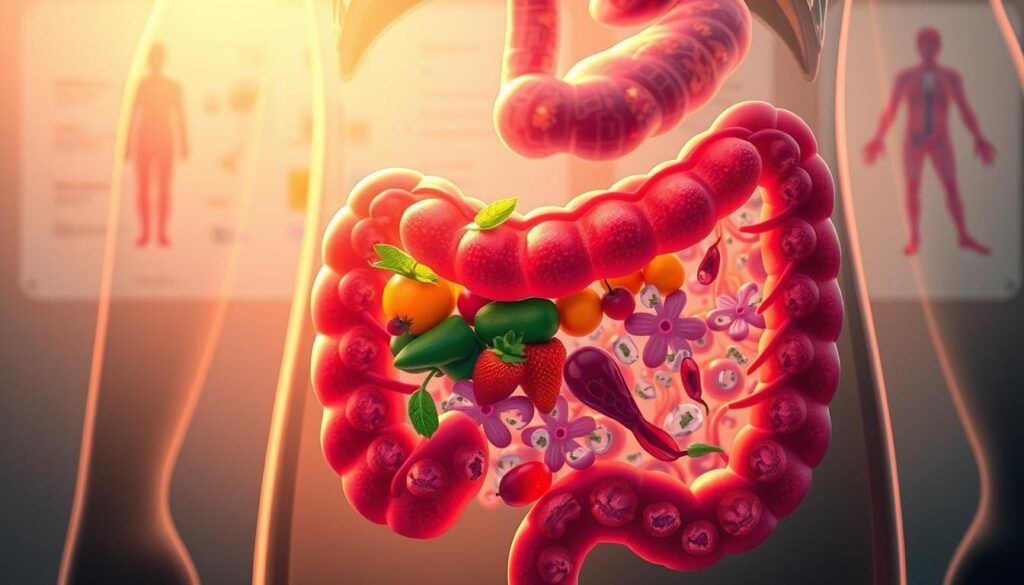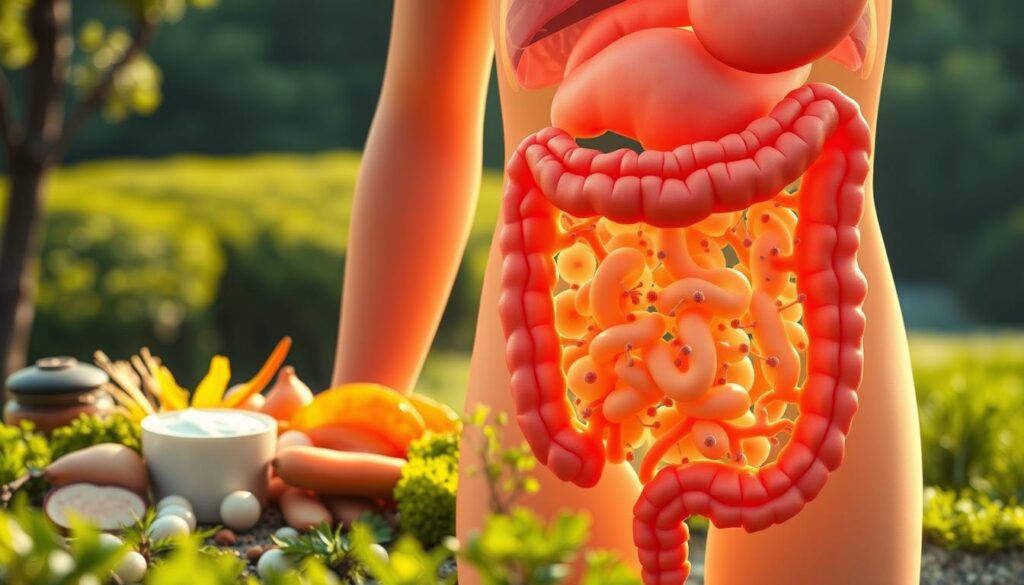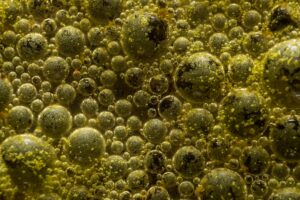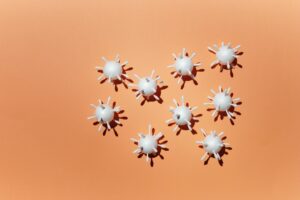Food That Makes Your Gut Happy and The Ones That Don’t
Discover which foods make your gut happy and which ones to avoid. Boost your digestion with our expert list!

A balanced gut microbiome is essential for overall health. It supports digestion, nutrient absorption, and even your immune system. Did you know 70% of your immune cells reside in your gut? This connection highlights how vital it is to care for your microbiome.
Probiotics, which are live bacteria, and prebiotics, which fuel these bacteria, are foundational for a healthy diet. Fermented options like sauerkraut and kimchi are excellent choices. They directly support gut integrity and offer numerous benefits.
On the flip side, refined sugars and processed meats can disrupt your microbiome. Avoiding these can help maintain a healthy balance. Understanding these factors can lead to better health and well-being.
Key Takeaways
- 70% of the immune system is linked to the gut.
- Probiotics and prebiotics are essential for gut health.
- Fermented foods like kimchi support gut integrity.
- Refined sugars and processed meats harm the microbiome.
- A balanced gut promotes digestion and nutrient absorption.
Why Your Gut Health Matters More Than You Think
Your gut health plays a pivotal role in overall wellness. It’s not just about digestion; the microbiome influences mental health, skin clarity, and even chronic disease risk. A balanced ecosystem of bacteria is essential for maintaining this delicate harmony.
Dysbiosis, or microbial imbalance, is linked to several health issues. Conditions like irritable bowel syndrome (IBS), autoimmune disorders, and obesity often stem from an unhealthy gut. Restoring balance can significantly improve these conditions.

Short-chain fatty acids (SCFAs) are crucial for reducing inflammation. Produced by gut bacteria, SCFAs support the immune system and protect the body from harmful pathogens. Including fiber-rich foods in your diet can boost SCFA production.
A Harvard study found that animal-based diets promote the overgrowth of Bilophila, a bacteria linked to inflammation. Conversely, plant-based diets foster a healthier microbiome. This highlights the importance of dietary choices.
Artificial sweeteners, as shown in a UK study, can disrupt glucose tolerance. This further emphasizes the need to avoid processed foods and opt for natural alternatives.
The Mediterranean Diet is a prime example of dietary diversity. Rich in fruits, vegetables, and healthy fats, it supports a thriving microbiome and provides essential nutrients.
| Factor | Impact on Gut Health |
|---|---|
| Dysbiosis | Linked to IBS, autoimmune disorders, and obesity |
| SCFAs | Reduce inflammation and support immunity |
| Animal-Based Diets | Promote Bilophila overgrowth |
| Artificial Sweeteners | Disrupt glucose tolerance |
| Mediterranean Diet | Enhances microbiome diversity |
Food That Makes Your Gut Happy and The Ones That Don’t
The connection between diet and gut health is undeniable. Probiotics, the live bacteria found in fermented options, thrive when paired with prebiotics. These prebiotics act as fuel, ensuring a balanced microbiome.
Sauerkraut, garlic, and asparagus are dual-action heroes. They provide both probiotics and prebiotics, making them essential for gut health. For example, inulin in asparagus feeds Bifidobacteria, a key player in maintaining health benefits.

Not all fermented options are equal. Kimchi contains Lactobacillus strains, while yogurt is rich in L. acidophilus. Both support digestion but offer unique health benefits. Similarly, omega-3s in salmon reduce gut permeability, enhancing overall well-being.
However, not all sauerkraut is created equal. Pasteurized versions lose their live bacteria, so always choose fresh over canned. As Dr. Barkyoumb notes,
“Probiotics not only support digestion but also boost mood, making them a win-win for overall health.”
By making informed choices, you can nurture a thriving microbiome and enjoy the health benefits of a balanced gut.
Top Gut-Friendly Foods to Add to Your Diet
The foods you eat daily have a direct impact on your internal ecosystem. By incorporating specific nutrients, you can support a thriving microbiome and improve overall well-being. Let’s explore the best options to include in your diet.
Fermented Foods: Nature’s Probiotic Powerhouses
Fermented foods are rich in probiotics, which are live bacteria essential for a healthy microbiome. Kefir, for example, contains more probiotics than yogurt, making it a superior choice. Other excellent options include kimchi and miso, both of which offer unique strains of beneficial bacteria.
Adding these to your meals can enhance digestion and boost immunity. As Dr. Barkyoumb notes,
“Probiotics not only support digestion but also improve mood, making them a win-win for overall health.”
Prebiotic-Rich Foods: Fuel for Good Bacteria
Prebiotics act as food for probiotics, ensuring they thrive in your gut. Raw garlic is a standout, thanks to its allicin content, which fights harmful pathogens. Asparagus is another great choice, packed with inulin, a fiber that feeds Bifidobacteria.
For a simple tip, try using apple cider vinegar in dressings. It’s an easy way to incorporate prebiotics into your daily meals. These small changes can make a big difference in maintaining a balanced microbiome.
Omega-3 Fatty Acids: The Unsung Gut Heroes
Omega-3s play a crucial role in gut health by increasing microbial diversity. Mackerel is an excellent source, offering high levels of these essential fatty acids. The NIH recommends consuming 1.1-1.6 grams of omega-3s daily for optimal benefits.
Research from Diabetes Care highlights the importance of avoiding fried foods, which can reduce microbiome diversity. Instead, focus on omega-3-rich options like salmon and flaxseeds to support a healthier gut.
Best Fermented Foods for Gut Health
Fermented foods are a powerhouse for maintaining a healthy internal ecosystem. Packed with live active cultures, they support digestion and boost immunity. Let’s explore the top options to include in your diet.
Yogurt: A Classic Probiotic Source
Yogurt is a well-known source of probiotics. Look for labels that mention live active cultures to ensure maximum benefits. Regular consumption can improve digestion and enhance nutrient absorption.
For a twist, try Nathalie’s roasted Brussels sprouts recipe with apple cider vinegar. It’s a delicious way to incorporate fermented flavors into your meals.
Kimchi: The Spicy Gut Booster
Kimchi is a fermented Korean dish rich in live active cultures. It’s not only flavorful but also packed with vitamin C and antioxidants. Studies suggest its anti-cancer properties make it a standout choice for gut health.
Adding kimchi to your diet can reduce inflammation and support a balanced microbiome. Its spicy kick adds excitement to any meal.
Sauerkraut: A Tangy Superfood
Sauerkraut, made from fermented cabbage, is a tangy superfood. Always choose unpasteurized versions to retain their live, active cultures. Homemade sauerkraut often surpasses store-bought options in quality and flavor.
This fermented delight is rich in fiber and supports gut integrity. Its versatility makes it easy to incorporate into salads and sandwiches or as a side dish.
Prebiotic Foods You Should Eat Daily
Incorporating prebiotic-rich foods into your daily meals can transform your digestive health. These nutrients act as fuel for the beneficial bacteria in your gut, ensuring a balanced and thriving microbiome. From flavorful garlic to fiber-packed asparagus, these choices are essential for overall wellness.
Garlic and Onions: Flavorful and Functional
Garlic and onions are more than just kitchen staples. They’re packed with prebiotics that support gut health. Raw garlic, in particular, contains allicin, a compound that promotes the growth of good bacteria. Try adding it to hummus for a tasty and functional snack.
Onions are equally impressive. They contain chromium, which helps regulate insulin levels. Including these vegetables in your diet can improve digestion and boost immunity. Whether sautéed or raw, they’re a versatile addition to any meal.
Asparagus: The Fiber Champion
Asparagus is a standout when it comes to prebiotics. Its high inulin content boosts Bifidobacteria by 30%, making it a top choice for gut health. Pair raw asparagus with tahini dressing for a simple yet effective way to enjoy its benefits.
Keep in mind that cooking can reduce prebiotic content by 25%. To maximize its potential, consider incorporating raw asparagus into salads or as a crunchy side dish. This fiber-rich vegetable is a must-have for a balanced diet.
How Omega-3s Support a Healthy Gut Microbiome
Omega-3 fatty acids play a crucial role in maintaining a balanced internal ecosystem. These essential nutrients are known to increase microbial diversity by 14%, according to recent research. This diversity is key to a thriving microbiome and overall wellness.
Studies from the NIH highlight another benefit: omega-3s are linked to a reduced risk of depression. This connection underscores their importance not just for physical health but also for mental well-being. Including omega-3-rich foods in your diet can have far-reaching effects.
Top sources of omega-3s include wild salmon, sardines, and mussels. These marine options are rich in EPA and DHA, which strengthen the gut barrier function. A robust gut barrier helps prevent harmful substances from entering the bloodstream, reducing inflammation.
Plant-based options like flaxseed also provide omega-3s, but their bioavailability is lower compared to marine sources. While flaxseed is a great addition to your diet, it’s best to combine it with marine options for maximum benefits.
By incorporating omega-3s into your meals, you can support a healthier microbiome and enjoy the numerous health benefits they offer. Whether through fish or plant-based sources, these fatty acids are a must for a balanced diet.
Foods That Harm Your Gut and How to Avoid Them
Certain dietary choices can disrupt your internal balance more than you realize. While some foods nourish your microbiome, others can starve beneficial gut bacteria and promote inflammation. Understanding these harmful options is key to maintaining digestive wellness.
Refined Sugar: The Gut’s Worst Enemy
Refined sugar is one of the biggest culprits. It spikes blood glucose levels and feeds harmful bacteria, starving the good ones. Hidden sources like agave syrup and sweetened beverages can sneak into your diet unnoticed.
A study found that excessive sugar intake reduces microbial diversity by 30%. This imbalance can lead to digestive issues and weaken your immune system. Opt for natural sweeteners like honey or fruits to satisfy your sweet tooth without harming your gut bacteria.
Processed Meats: A Double Whammy of Harm
Processed meats like salami and bacon are packed with nitrates, which convert into carcinogens in the body. These compounds not only harm your microbiome but also increase the risk of chronic diseases.
Harvard research highlights another concern: industrial meat often contains antibiotics, which can lead to resistance in harmful bacteria. Instead of processed options, choose lean alternatives like turkey breast or grilled chicken for a healthier gut.
| Harmful Food | Impact | Healthier Swap |
|---|---|---|
| Refined Sugar | Starves gut bacteria, spikes blood sugar | Honey, fruits |
| Processed Meats | Contains nitrates, promotes inflammation | Turkey breast, grilled chicken |
The Hidden Dangers of Artificial Sweeteners
Artificial sweeteners might seem like a healthier choice, but they can harm your gut. These sugar substitutes are often used to reduce calorie intake, but they come with hidden risks. Studies show they can disrupt the balance of gut bacteria, leading to long-term health issues.
Some of the worst offenders include saccharin and aspartame. These sweeteners alter the Firmicutes/Bacteroidetes ratio in your microbiome. This imbalance can trigger inflammation and increase the risk of metabolic disorders.
For example, research shows that sucralose increases pro-inflammatory cytokines by 40%. This can worsen conditions like irritable bowel syndrome (IBS) and weaken your immune system. A UK study also linked artificial sweeteners to glucose intolerance, further highlighting their dangers.
Instead of these harmful options, consider natural alternatives like stevia and monk fruit. These sweeteners are derived from plants and don’t disrupt your gut bacteria. They provide a healthier way to satisfy your sweet tooth without compromising your digestive health.
“Artificial sweeteners not only disrupt gut health but also increase the risk of metabolic issues.”
By making informed choices, you can protect your microbiome and maintain overall wellness. Avoiding artificial sweeteners is a simple yet effective step toward better health.
Why Fried Foods Wreak Havoc on Digestion
Fried foods might taste delicious, but they can seriously harm your digestive system. When oils are heated to high temperatures, they produce acrylamide, a harmful compound linked to inflammation and other health issues. This chemical not only damages your gut lining but also disrupts the balance of your microbiome.
According to a Diabetes Care study, fried meats reduce microbial diversity by 22%. This imbalance can lead to leaky gut syndrome, where harmful substances pass through the intestinal wall into the bloodstream. Over time, this condition can trigger chronic inflammation and weaken your immune system.
To minimize these risks, consider healthier cooking methods like air-frying. This technique uses less oil and reduces the formation of harmful compounds. It’s a simple swap that can protect your gut while still delivering crispy, satisfying results.
Some of the worst offenders include french fries, doughnuts, and fried chicken. These foods are often loaded with unhealthy fats and lack essential nutrients. By limiting their consumption, you can support a healthier digestive system and overall well-being.
| Fried Food | Health Impact |
|---|---|
| French Fries | High in acrylamide, promotes inflammation |
| Doughnuts | Loaded with sugar and unhealthy fats |
| Fried Chicken | Reduces microbial diversity, harms gut lining |
Making informed choices about how you cook and what you eat can significantly improve your digestive health. Avoiding fried foods and opting for healthier alternatives is a step toward a happier, more balanced microbiome.
Simple Swaps for a Happier Gut
Small changes in your daily diet can significantly improve your digestive wellness. By making smart swaps, you can support a balanced gut health and enjoy long-term benefits. Here are some easy adjustments to try today.
Replace white rice with quinoa for a fiber boost. Quinoa contains 50% more fiber, which fuels beneficial bacteria in your gut. This simple change can enhance digestion and keep you feeling fuller longer.
Trade soda for kombucha, a fizzy drink packed with probiotics. Kombucha supports a healthy microbiome and provides a refreshing alternative to sugary beverages. It’s a win-win for your taste buds and your gut health.
Use Greek yogurt instead of sour cream in recipes. Greek yogurt is rich in probiotics and adds a creamy texture to dishes. It’s a versatile ingredient that can elevate both savory and sweet meals.
Opt for dark chocolate with over 70% cacao instead of milk chocolate. Dark chocolate contains polyphenols, which promote the growth of good bacteria. It’s a delicious way to support your diet while satisfying your sweet tooth.
Include Nathalie’s immunity bone broth soup in your meal plan. This nutrient-rich recipe is packed with collagen and amino acids that heal the gut lining. It’s a comforting and nourishing addition to any diet.
| Swap | Benefit |
|---|---|
| Quinoa instead of white rice | Boosts fiber intake |
| Kombucha instead of soda | Adds probiotics |
| Greek yogurt instead of sour cream | Rich in probiotics |
| Dark chocolate instead of milk chocolate | Promotes good bacteria |
| Bone broth soup | Heals gut lining |
Conclusion
Taking care of your digestive system can transform your overall wellness. Incorporating gut-health-friendly options like kimchi, asparagus, and wild salmon can make a big difference. These foods are packed with probiotics and nutrients that support a balanced microbiome.
On the flip side, avoid refined sugar and artificial sweeteners. These can disrupt your internal balance and harm beneficial bacteria. Instead, focus on natural alternatives to keep your diet clean and nourishing.
Start small by adding one fermented food to your meals daily. Gradual changes are easier to maintain and can lead to lasting improvements. As Nathalie says, “A healthy mind starts with a strong gut!”




